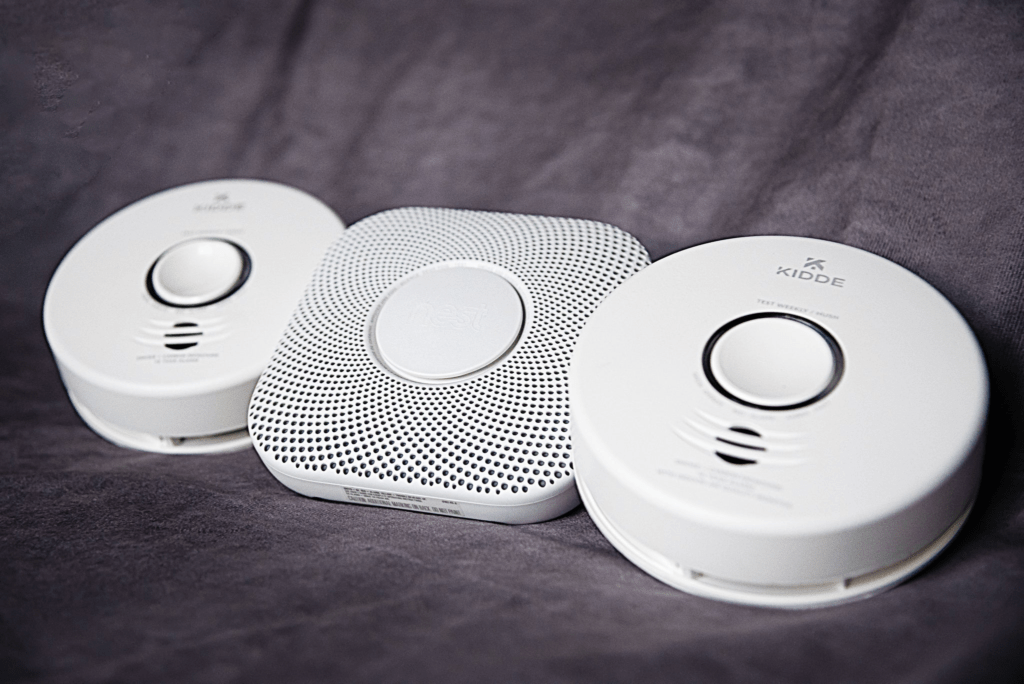The Importance of Proper Smoke Detector Maintenance
Smoke detectors are your first line of defense against fire in your home. They can save lives by alerting you to danger early, giving you precious time to escape. But for smoke detectors to do their job, you need to take care of them. Let’s talk about why and how to maintain your smoke alarms.

Regular Testing: Don’t Wait for an Emergency
You should test your smoke detectors at least once a month. It’s simple – just press the test button and listen for the loud beep. If you don’t hear it, or if it’s weak, it’s time to take action. Regular testing ensures your alarm will work when you need it most.
Battery Replacement: Keep the Power On
Most smoke alarms run on batteries. These need to be changed regularly, usually once a year. Some people do this on a specific date, like New Year’s Day, to help remember. If your alarm starts chirping, it’s telling you the battery is low. Don’t ignore this sound – replace the batteries right away.
Cleaning: Dust-Free for Better Detection
Dust and dirt can make your smoke detector less sensitive. Clean your alarms twice a year with a vacuum cleaner attachment or a soft brush. This simple step can help prevent false alarms and ensure your detector works properly.
Know When to Replace
Smoke detectors don’t last forever. Most should be replaced every 10 years. If you’re not sure how old yours are, check the date on the back. If there’s no date, it’s probably time for a new one.
Maintenance Tips for Better Protection
- Keep track of when you last changed batteries or tested alarms.
- Never paint over smoke detectors.
- Make sure everyone in your home knows what the alarm sounds like and what to do when they hear it.
- If you have hardwired alarms, make sure they have battery backups.
- Consider interconnected alarms that all go off together for better coverage in larger homes.
Taking care of your smoke detectors might seem like a small task, but it can make a big difference in keeping you and your family safe. Make smoke alarm maintenance a regular part of your home care routine. It’s a small effort that could save lives.
Step-by-Step Guide to Installing Smoke Detectors in Your Home

Installing smoke detectors is a crucial step in protecting your home and family. Here’s a simple guide to help you set up these life-saving devices properly.
Choosing Your Smoke Detectors
- Decide between wired and wireless alarms:
- Wired alarms connect to your home’s electrical system
- Wireless alarms run on batteries
- Consider interconnected alarms:
- These communicate with each other
- When one detects smoke, all alarms in the house sound
Where to Place Smoke Detectors
- Install at least one on every level of your home
- Put one inside and outside each sleeping area
- Place them on the ceiling or high on the wall
- Keep them away from windows, doors, and air vents
Installation Process

- For ceiling mounting:
- Mark the spot where you’ll install the alarm
- Drill holes for the mounting bracket
- Secure the bracket with screws
- Attach the detector to the bracket
- For wall mounting:
- Place the detector 4-12 inches below the ceiling
- Follow the same steps as ceiling mounting
- For wired alarms:
- Turn off the power at the circuit breaker
- Connect the alarm wires to your home’s wiring
- Secure the alarm to the electrical box
- For wireless alarms:
- Simply follow the ceiling or wall mounting steps
- Insert the batteries
- For interconnected systems:
- Follow the manufacturer’s instructions to link the alarms
Testing Your New System

- Press the test button on each alarm
- Make sure you can hear them clearly throughout your home
Remember, if you’re not comfortable with electrical work, especially for wired systems, it’s best to hire a professional. The most important thing is to have working smoke detectors properly installed in your home.
Regular maintenance is key after installation. Test your alarms monthly, replace batteries yearly, and replace the entire unit every 10 years. With proper installation and care, your smoke detectors will provide round-the-clock protection for your home and family.
Upgrading to Smart Smoke Detectors: Features and Benefits

Smart smoke detectors are the latest evolution in home safety technology. They offer enhanced features that go beyond traditional alarms, providing better protection and convenience. Let’s explore what makes these devices “smart” and how they can benefit your home.
Key Features of Smart Smoke Detectors
Mobile App Integration
- Get alerts on your smartphone when the alarm detects smoke
- Silence false alarms remotely
- Check battery levels and device status from anywhere
Voice Alerts
- Clear, spoken warnings instead of just beeps
- Can tell you which room the danger is in
- Some models offer multilingual alerts
Interconnected System
- All alarms in your home communicate with each other
- When one detects smoke, all alarms sound
- Helps alert you no matter where you are in the house
Self-Testing and Diagnostics
- Regular automatic tests ensure the device is working
- Sends notifications if there’s a problem
Smart Home Integration
- Works with other smart devices in your home
- Can trigger lights to turn on or HVAC systems to shut off in case of fire
Benefits of Upgrading

Improved Safety
- Faster, more detailed alerts
- Better coverage throughout your home
Peace of Mind
- Check on your home’s safety even when you’re away
- Receive immediate notifications of any issues
Convenience
- Easy to test and maintain
- Can often be controlled from your phone
Long-term Cost Savings
- Many have long-lasting batteries (5-10 years)
- Fewer false alarms mean less wasted time and stress
Enhanced Features
- Some models also detect carbon monoxide
- Others can monitor air quality or serve as nightlights
Popular Smart Smoke Detector Options

While specific product recommendations can change over time, some well-known brands in this space include Nest Protect, First Alert OneLink, and Kidde. Always check recent reviews and compare features to find the best fit for your home.
Things to Consider
- Cost: Smart detectors are more expensive than traditional ones
- Wi-Fi Dependency: Most require a stable internet connection
- Privacy: Consider the data these devices collect and how it’s used
Upgrading to smart smoke detectors can significantly enhance your home’s safety system. With features like mobile alerts, voice warnings, and smart home integration, these devices offer a new level of protection and convenience. While they require a bigger upfront investment, the added peace of mind and advanced capabilities make them worth considering for many homeowners.
Integrating Smoke Detectors with a Whole-Home Fire Alarm System

A whole-home fire alarm system takes your fire safety to the next level. It combines smoke detectors with other safety devices to create a comprehensive protection network. Here’s what you need to know about integrating smoke detectors into a larger system.
Components of a Whole-Home Fire Alarm System
- Smoke Detectors
- Heat Sensors
- Carbon Monoxide Detectors
- Control Panel
- Alarm Sounders
- Strobes for Visual Alerts
- Manual Pull Stations
- Monitoring Service Connection
Integration Process
- System Design
- A professional assesses your home layout
- They determine the best locations for all devices
- They create a plan that meets fire safety codes
- Installation
- Wiring is run throughout the house
- Devices are installed and connected to the control panel
- The system is programmed and tested
- Connecting to Monitoring Services
- The system is linked to a 24/7 monitoring center
- This ensures emergency services are alerted even if you’re not home
Benefits of an Integrated System
- Comprehensive Protection
- Detects various types of fire hazards
- Covers all areas of your home
- Faster Response Times
- Automatic alert to fire department
- Quicker evacuation with whole-house alarms
- Code Compliance
- Meets or exceeds local fire safety regulations
- Important for both residential and commercial properties
- Potential Insurance Discounts
- Many insurers offer reduced rates for homes with professional systems
Professional Fire Alarm Services

While DIY installation is possible for basic smoke detectors, a whole-home system usually requires professional help:
- Initial Consultation
- System Design
- Professional Installation
- Regular Maintenance and Testing
- 24/7 Monitoring Services
- System Upgrades as Needed
Commercial Smoke Detector Requirements
Commercial buildings often have stricter fire safety rules:
- More detectors required per square foot
- Specific types of detectors for different areas (e.g., heat detectors in kitchens)
- Regular professional inspections
- Documented maintenance and testing
- Backup power systems
- Integration with building management systems
Fire Safety Code Compliance
Fire codes vary by location but generally cover:
- Number and placement of detectors
- Types of detectors required
- Integration with sprinkler systems
- Emergency lighting and exit signs
- Fire extinguisher placement
- Evacuation plan requirements
Integrating smoke detectors into a whole-home fire alarm system provides the highest level of fire protection for your property. While it requires a bigger investment and professional help, the enhanced safety and peace of mind are invaluable. For commercial properties, such systems are often required by law and are crucial for protecting employees, customers, and assets. Always consult with fire safety professionals to ensure your system meets all local codes and provides the best possible protection.
Tips for Maintaining a Reliable Home Fire Alarm Network

A reliable fire alarm network is crucial for keeping your home and family safe. Here are some key tips to ensure your system stays in top working condition:
Regular Testing Schedule
- Test smoke detectors monthly
- Press and hold the test button
- Listen for a loud, piercing alarm
- If the sound is weak or absent, replace batteries or the unit
- Perform a “smoke test” twice a year
- Use an aerosol spray made for testing smoke alarms
- This checks if the sensor can detect smoke
Battery Life and Replacement
- Replace batteries annually
- Pick a memorable date, like New Year’s Day
- Some newer models have 10-year sealed batteries
- Never use rechargeable batteries
- They lose charge too quickly for safe use in alarms
- If your alarm chirps, replace the battery immediately
Smoke Detector Replacement Guidelines
- Replace all smoke detectors every 10 years
- Check the manufacture date on the back of the unit
- If there’s no date, it’s likely over 10 years old
- Upgrade to newer technology when replacing
- Consider photoelectric sensors or dual-sensor alarms
- Look into smart detectors for added features
Cleaning and Maintenance
- Gently vacuum your detectors every six months
- Use a soft brush attachment
- This removes dust that can interfere with sensors
- Never paint over smoke detectors
- Paint can block the sensors
- Keep detectors free from obstructions
- Ensure nothing is blocking them, like curtains or decorations
System Monitoring
- For connected systems, check the control panel regularly
- Look for any error messages or warnings
- If you have professional monitoring, test the connection annually
- Contact your monitoring company for a system check
- Update contact information with your monitoring service
- Ensure they have current phone numbers and emergency contacts
Additional Tips
- Keep a log of all maintenance activities
- Record dates of tests, battery changes, and replacements
- Check your homeowner’s insurance policy
- Some offer discounts for well-maintained fire alarm systems
- Review and practice your family’s fire escape plan regularly
- For hardwired systems, ensure the circuit breaker is always on
- If you have interconnected alarms, replace all units at the same time
Remember, a well-maintained fire alarm network is your first line of defense against home fires. These simple steps can help ensure your system works when you need it most. If you’re ever unsure about your system’s performance or need help with maintenance, don’t hesitate to contact a fire safety professional. Your family’s safety is worth the effort and investment in proper fire alarm care.
Conclusion: Prioritizing Smoke Detector Maintenance for a Safer Home

Smoke detectors play a crucial role in protecting our homes and loved ones from the dangers of fire. As we’ve explored throughout this guide, proper maintenance of these life-saving devices is not just important—it’s essential. Let’s recap why prioritizing smoke detector care should be at the top of every homeowner’s safety checklist:
- Life-Saving Potential
- Well-maintained smoke detectors provide early warning
- They give you precious time to escape in case of a fire
- This simple device can mean the difference between life and death
- Peace of Mind
- Knowing your detectors are working properly reduces worry
- You can rest easier knowing you’ve taken steps to protect your family
- Legal and Insurance Compliance
- Many areas require functioning smoke detectors by law
- Proper maintenance can help with insurance claims if needed
- Cost-Effective Safety
- Compared to other home safety measures, smoke detectors are inexpensive
- Regular maintenance extends their life, saving money in the long run
- Reduced False Alarms
- Well-maintained detectors are less likely to give false alerts
- This prevents “alarm fatigue” where people might ignore real warnings








2 thoughts on “Mastering Smoke Detector Maintenance and Installation: Keeping Your Home Safe”
Pingback: Why Proper Fire Pump Room Maintenance Is Crucial for Building Safety - Basic Elements
Pingback: Fire Extinguishers: Your First Line of Defense Against Fires - Basic Elements
Comments are closed.